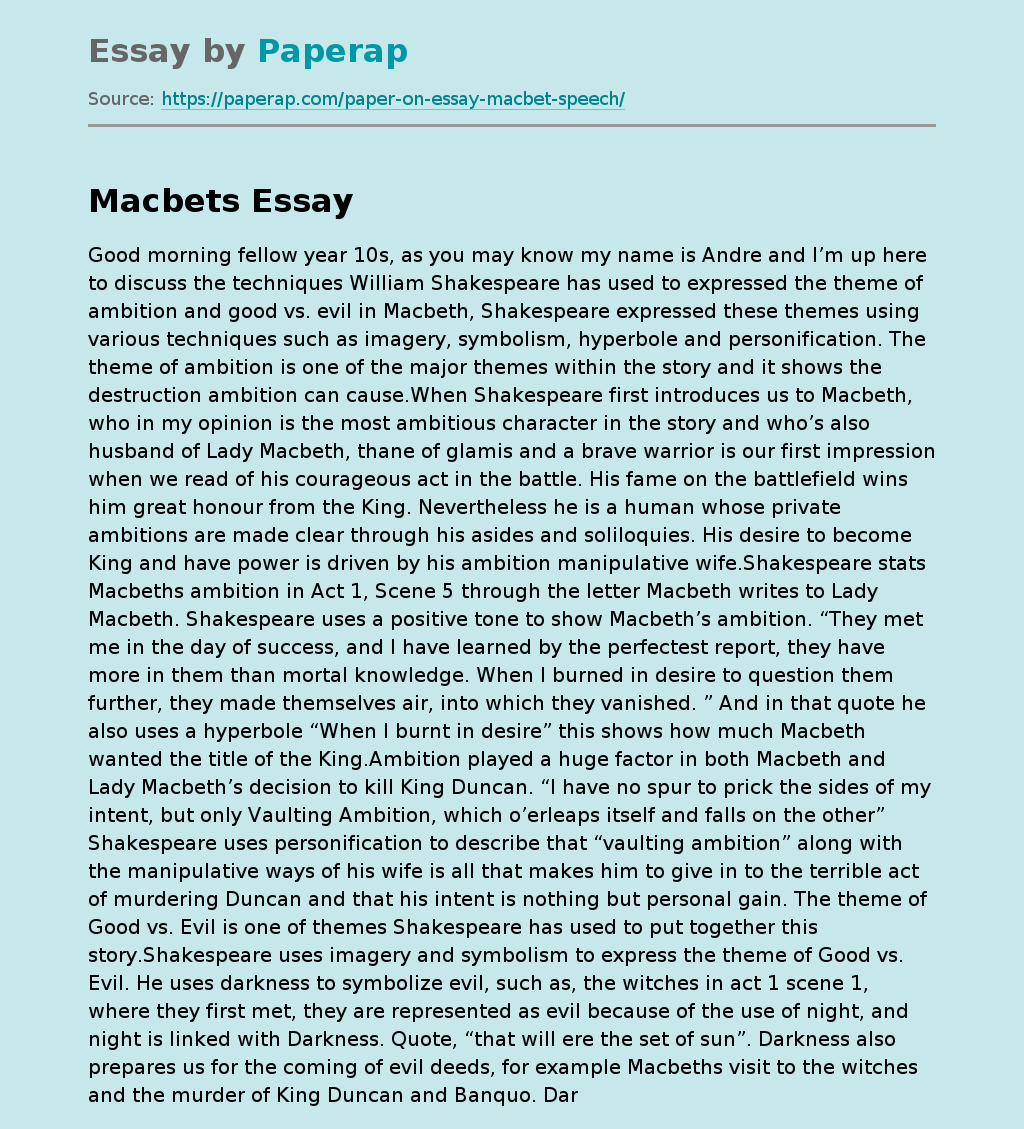"Macbeth" by William Shakespeare
The following example essay on “Macbeth by William Shakespeare” discuss the techniques William Shakespeare has used to express the theme of ambition and good vs. evil in Macbeth, Shakespeare expressed these themes using various techniques such as imagery, symbolism, hyperbole and personification.
The theme of ambition is one of the major themes within the story and it shows the destruction ambition can cause.When Shakespeare first introduces us to Macbeth, who in my opinion is the most ambitious character in the story and who’s also husband of Lady Macbeth, thane of glamis and a brave warrior is our first impression when we read of his courageous act in the battle.
His fame on the battlefield wins him great honour from the King.
Nevertheless he is a human whose private ambitions are made clear through his asides and soliloquies. His desire to become King and have power is driven by his ambition manipulative wife.Shakespeare stats Macbeths ambition in Act 1, Scene 5 through the letter Macbeth writes to Lady Macbeth.
Shakespeare uses a positive tone to show Macbeth’s ambition. “They met me in the day of success, and I have learned by the perfectest report, they have more in them than mortal knowledge.
When I burned in desire to question them further, they made themselves air, into which they vanished. ” And in that quote he also uses a hyperbole “When I burnt in desire” this shows how much Macbeth wanted the title of the King.Ambition played a huge factor in both Macbeth and Lady Macbeth’s decision to kill King Duncan.
“I have no spur to prick the sides of my intent, but only Vaulting Ambition, which o’erleaps itself and falls on the other” Shakespeare uses personification to describe that “vaulting ambition” along with the manipulative ways of his wife is all that makes him to give in to the terrible act of murdering Duncan and that his intent is nothing but personal gain.
The theme of Good vs. Evil is one of themes Shakespeare has used to put together this story.Shakespeare uses imagery and symbolism to express the theme of Good vs. Evil. He uses darkness to symbolize evil, such as, the witches in act 1 scene 1, where they first met, they are represented as evil because of the use of night, and night is linked with Darkness. Quote, “that will ere the set of sun”. Darkness also prepares us for the coming of evil deeds, for example Macbeths visit to the witches and the murder of King Duncan and Banquo.
Darkness also helps create an image in your head while you’re reading about the murders.Blood symbolizes both Good and Evil and changes in meaning throughout the play. For example in Act 1, scene 2, “For brave Macbeth—well he deserves that name— Disdaining fortune, with his brandish’d steel, which smoked with bloody execution, like valor’s minion carved out his passage till he faced the slave” in this case Shakespeare uses blood as a symbol of honour and loyalty. Then it turns around in Act 2, Scene 2 when Macbeth and Lady Macbeth murder King Duncan “As they had seen me with these hangman’s hands. ”
Hangman’s hands meaning Bloody hands.Blood comes to symbolize their guilt they have, and they begin to feel that their crimes have marked them in a way that cannot be washed clean. “Will all great Neptune’s ocean wash this blood / Clean from my hand? ” which means he wants to wash off the guilt. Shakespeare uses water as a symbol of good because water represents purity. In conclusion, William Shakespeare has smartly used various techniques to express the major themes of Ambition and Good vs. Evil. And in doing so it helps to describe the story thoroughly and while reading it helps create an image in your head about what’s going on.
"Macbeth" by William Shakespeare. (2019, Dec 05). Retrieved from https://paperap.com/paper-on-essay-macbet-speech/

